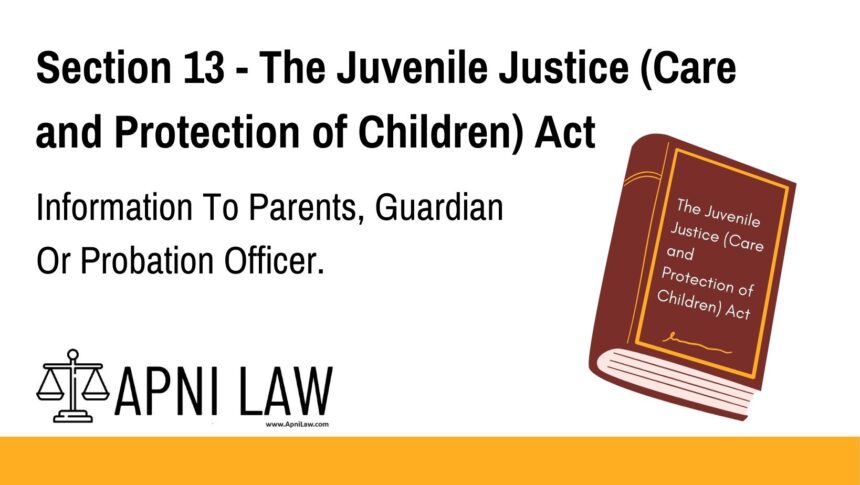Code
(1) Where a child alleged to be in conflict with law is apprehended, the officer designated as Child Welfare Police Officer of the police station, or the special juvenile police unit to which such child is brought, shall, as soon as possible after apprehending the child, inform—
(i) the parent or guardian of such child, if they can be found, and direct them to be present at the Board before which the child is produced; and
(ii) the probation officer, or if no probation officer is available, a Child Welfare Officer, for preparation and submission within two weeks to the Board, a social investigation report containing information regarding the antecedents and family background of the child and other material circumstances likely to be of assistance to the Board for making the inquiry.
(2) Where a child is released on bail, the probation officer or the Child Welfare Officer shall be informed by the Board.
Explanation
Section 13 mandates immediate communication and procedural involvement of key parties after the apprehension of a child in conflict with law. The section ensures two critical actions:
-
Prompt notification of the child’s parent or guardian.
-
Engagement of a probation officer (or Child Welfare Officer) to prepare a detailed social investigation report (SIR) within two weeks.
This report is crucial to enable the Juvenile Justice Board to understand the child’s socio-economic context and make informed, rehabilitative decisions.
Illustration
Example:
A 15-year-old is apprehended for vandalism. The Child Welfare Police Officer promptly contacts his parents and directs them to appear before the Board. Simultaneously, a probation officer begins gathering data on the child’s background, education, peer group, and home environment, and submits the social investigation report within the stipulated 14 days.
Common Questions & Answers
Q1: Who is a Child Welfare Police Officer?
A: An officer specially designated at every police station to handle cases involving children, trained in child rights and juvenile procedures.
Q2: What is the purpose of the Social Investigation Report?
A: The SIR provides the Board with vital insights into the child’s background, helping it determine suitable rehabilitative or protective measures.
Q3: What if the parent or guardian is not traceable?
A: Efforts must be made to locate them, but the inquiry process continues with the involvement of a probation or child welfare officer.
Q4: Is informing the probation officer necessary even if the child is granted bail?
A: Yes, Section 13(2) mandates that the Board must inform the probation or child welfare officer even if the child is released on bail.
Conclusion
Section 13 reinforces the child-centric approach of the Juvenile Justice system by mandating prompt communication with parents or guardians and ensuring a timely, comprehensive assessment of the child’s background. This ensures that no child is processed in isolation, and all decisions of the Board are informed by context, compassion, and concern for the child’s welfare and development. It bridges procedural due process with restorative justice.








